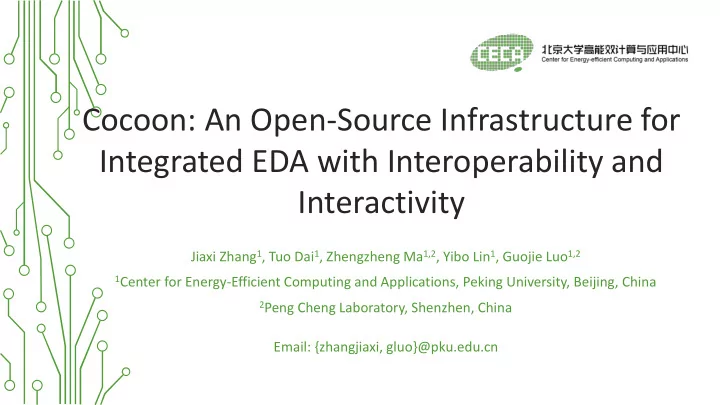

Cocoon: An Open-Source Infrastructure for Integrated EDA with Interoperability and Interactivity Jiaxi Zhang 1 , Tuo Dai 1 , Zhengzheng Ma 1,2 , Yibo Lin 1 , Guojie Luo 1,2 1 Center for Energy-Efficient Computing and Applications, Peking University, Beijing, China 2 Peng Cheng Laboratory, Shenzhen, China Email: {zhangjiaxi, gluo}@pku.edu.cn
Background and Motivation 2 Background – Modern IC design requires the joint efforts of EDA tool developers, system integrators and IC designers – “The EDA companies had grown from a lot of acquisitions so that’s what they had for sale: good point tools that were poorly integrated.” -- Paul McLellan in EDAgraffiti Motivation – Over-optimized point tools + poorly integrated flow ⇒ Moderately optimized customized tools + easy- to-customized integrated flow – The existing open source flows still need extended development to be available - OpenRoad Flow [1], DATC Robust Design Flow [2] – Similar attempts - EDAlize [3], Hammer [4] [1] T. Ajayi , et al., “Toward an open -source digital flow: First learnings from the OpenROAD project,” DAC 2019. [2] J. Jung, et al., “DATC RDF: Robust design flow database,” ICCAD 2017. [3] Edalize: https://github.com/olofk/edalize [4] Hammer: https://github.com/ucb-bar/hammer
Integrated EDA 3 What is Integrated EDA? – Expanded from Electronic CAD Framework [5] – A system composed of EDA point tools, designs, and interfaces – Users: EDA researchers, tool developers, and IC designers Ideal Characteristics of Integrated EDA – Interoperability (Within the EDA flow) - The ability of two or more point tools to exchange design information - Support the mixing of tools from different vendors of open source community – Interactivity (Beyond the EDA flow) - A unified user interface, supporting users to flexibly select and deploy different point tools - A unified and abstract programming interface, supporting automated design methodology research and flow tuning [5] Barnes T J, Harrison D, Newton A R, et al. Electronic CAD frameworks[M]. Springer Science & Business Media, 2012.
Integrated EDA 4 Possible Solutions of Integrated EDA – Open standards: Liberty, LEF/DEF, SDC, etc. – Cross tool API: Higher level of API abstraction than TCL – Steps Abstraction: logic synthesis, place, cts, route, etc. Legality check are need – EDA brokers: Tools or tool parameters recommendation (Human experts or AI) – Model-based DSL: Domain specific language for design flows Approaches in Inter- Corresponding approaches Available in connected Cloud in Integrated EDA existing flows? Open Standards/Protocols Open Standards YES Cross-platform APIs Cross-tool APIs NO Layers Abstraction Steps Abstraction YES Cloud Brokers/Agents EDA Brokers/Agents NO Model-based DSL Flow-based DSL NO
Cocoon: Architecture 5 Key Features – Cross-tool APIs - Applications layer, interfaces layer, data layer - Checkpoint design (including history running scripts) - Fast designs and reports extraction – EDA Brokers - Customized flow and Legality Check Mechanism - Learning-based flow tuning and optimization Repo: https://github.com/pku-dasys/cocoon
Cocoon: Customized Flow 6 Customized Flow Definition – Branching flow - Scenarios1: Compare the better one and do next steps - Scenarios2: Partition the design and do each part parallel – Iterating flow - Scenarios1: Bad QoR - Scenarios2: Back annotation (physical-aware high level synthesis and logic synthesis)
Cocoon: Customized Flow 7 Flow Tuning – EDA tools provide numerous options and parameters that can drastically impact design quality – Design space exploration – Method - Search strategies (SA, GA) - Parallel computing - Learning-based methods
Implementation and Evaluation 8 Implementation – Python 3 – Applications layer are implemented as classes - Each class will wrap the implementation of a tool, including member functions like parameters setting and scripts generation – Data layer is implemented as a database with a fixed directory – Interfaces layer are implemented as global functions Evaluation – Branching flow - Demo code – Flow tuning - Baseline method: Bayesian Optimization for black-box optimization
Future work 9 Beautify the UI for users Integrate more open source tools Implement legality check Cloud Infrastructure – Distributed checkpoint design – Computation graph scheduling of applications
Recommend
More recommend